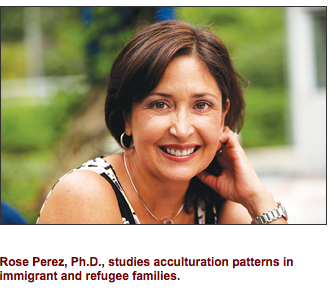By Joanna Klimaski via Inside Fordham
Rose M. Perez was 8 years old when her family left Cuba.
She remembers holding her mother’s hand as they marched with the line of travelers across the tarmac toward the plane. Suddenly her mother paused and looked upward, her expression stoic.
“I said ‘Mom, come on, the line is getting ahead of us,’” said Perez, Ph.D., an assistant professor at the Graduate School of Social Service (GSS). “I knew something was wrong, because she didn’t respond.”
Years later Perez learned that her mother had intentionally slowed down so that her relatives who gathered to watch the family depart would be able to see their place in the line.
Perez’s struggle to balance her Cuban and American cultures inspired her research on the adaptation of immigrants and refugees to U.S. society and how immigrants reconcile the worlds they must straddle.
Read more here.

